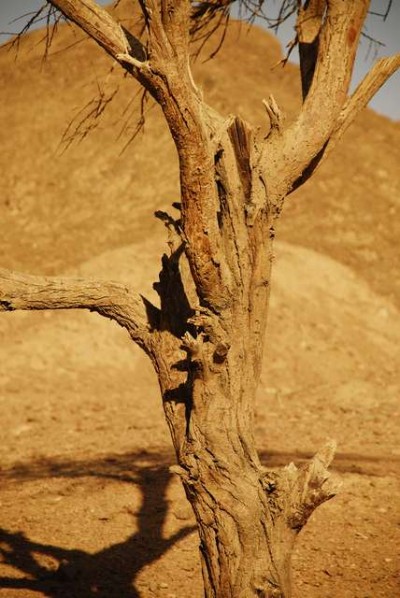|
SHITTAH TREE >> Knowledge of Divine Protection
 Mr. Grindon says, in agreement with the Dictionary of the Bible: Mr. Grindon says, in agreement with the Dictionary of the Bible:
It has long been known that by shittah is intended one of the species of the beautiful genus acacia, the Hebrew word being no other than the Egyptian sont, or sunt, by which name it is known to the present day in the ancient country of the Pharaohs, the n being omitted when the word passed into the language of the Old Testament.
Dean Stanley also remarks, in speaking of the vegetation of Sinai:
The wild acacia, under the name of sont, everywhere represents the seneh, or senna, of the Burning Bush. A slightly different form of the tree, equally common under the name of sayal, is the ancient shittah, or, as more usually expressed in the plural form (from the tangled thickets into which its stem expands), the shittim, of which the tabernacle was made—an incidental proof, it may be observed, of the antiquity of the institution, inasmuch as the acacia, though the chief growth of the desert, is very rare in Palestine.
The name acacia means the thorn tree, and no name could be better deserved; for not only are the trunk and branches beset with pairs of thorns, but every twig presents a thorny point. And yet it is a pretty tree; the foliage with its many leaflets is graceful, and in the spring the tree is illumined by innumerable little golden balls of fragrant blossoms.
It is abundant everywhere in Egypt and in the desert, and furnishes the natives with the toughest material for tools and the frames of their boats, a considerable part of their fuel, and the gum arabic of commerce. The wood is closegrained, heavy, and extremely enduring; some specimens still exist which are believed to be five or six thousand years old.
 Fruit trees correspond to intelligence concerning good uses, and their twigs are the particulars of such intelligence. But some fruit trees, when growing wild or neglected, harden their twigs into thorns, as is the case with pear trees; and such twigs correspond to intelligence, not about uses to others, but about protection from intruders. However unsatisfactory in a character it may be to find only reserve and caution against intrusion, where we have a right to expect open-hearted friendliness, yet there is a right place and a use for such protection. Such an attitude of mind is necessary towards the idle and wasteful, and still more towards those who come with worse intent. There is a use in walls and gates to the Holy City, to protect the inhabitants by shutting out evil; and the natural walls of the vegetable kingdom are thorny shrubs and trees. Fruit trees correspond to intelligence concerning good uses, and their twigs are the particulars of such intelligence. But some fruit trees, when growing wild or neglected, harden their twigs into thorns, as is the case with pear trees; and such twigs correspond to intelligence, not about uses to others, but about protection from intruders. However unsatisfactory in a character it may be to find only reserve and caution against intrusion, where we have a right to expect open-hearted friendliness, yet there is a right place and a use for such protection. Such an attitude of mind is necessary towards the idle and wasteful, and still more towards those who come with worse intent. There is a use in walls and gates to the Holy City, to protect the inhabitants by shutting out evil; and the natural walls of the vegetable kingdom are thorny shrubs and trees.
The noblest plants of this class are the acacias; and the noblest corresponding spiritual growths are those of a knowledge of the Divine protection—a knowledge which comes from experience of the Divine power in repelling and shutting out evil from the mind. Swedenborg says that shittim wood “denotes the good of merit and of justice, which is of the Lord alone. The reason why it also denotes love is because the Lord, when He was in the world, from Divine love fought against all the hells and subdued them, and thereby saved the human race, and hence alone had merit, and was made justice; wherefore the good of the Lord’s merit is His Divine love” (Arcana Coelestia #10178).
That is to say this wood corresponds, in individuals and in the heavens, to the sense that the Lord alone fights for man against the hells, and to the consequent sense that His is all the power of good. The same thing is taught in other passages, especially in Arcana Coelestia #9486,9715; in the latter of which numbers, after repeating that shittim wood denotes “the good of merit and justice which are of the Lord alone,” these terms are explained as follows:
By His merit is meant that He fought alone with all the hells, and subdued them, and so reduced into order all things in the hells, and then at the same time all things in the heavens. . . . The good of the Lord’s merit is also now the continual subjugation of the hells, and so the protection of the faithful; this good is the good of the Lord’s love, for, from Divine love in the world, He fought and conquered. From Divine power thence acquired in the human, He afterwards alone fights and conquers to eternity for heaven and for the Church, thus for the universal human race, and thereby saves them. This now is the good of merit, which is called justice, because it is of justice to restrain the hells which endeavor to destroy the human race, and to protect and save the good and the faithful.
The planks of the tabernacle were of shittim wood, representing the sense, in heaven and in the Church, of the sustaining and protecting power of the Lord’s love (Arcana Coelestia #9634). The ark also, and the table, and the altarswere of shittim wood, overlaid with gold or with brass; because the acts and states of worship which they represent are interiorly of the Lord’s saving power.
Swedenborg, in Arcana Coelestia #9472, speaks of the shittim wood as a “species of cedar,” following Schmidius in the comment which he several times intrudes into his text, and into his translation of Isaiah 41:19. But that light of heaven which does reveal heavenly things, though not natural, caused Swedenborg consistently to see and to teach that everywhere the shittim wood stands in the Word for a knowledge of the saving and sustaining power of the Lord, and not for the rational knowledge of the relation between things natural and spiritual, which, as he uniformly states, is represented by the successive planes of verdure of the cedar tree.
It is interesting to notice that the acacia is a tree of the desert, or of the borders of the desert, as the knowledge of the Divine protection is a knowledge that grows in states of temptation. The beautiful foliage of many leaflets, twice compounded, in some related species sensitively shrinking from the lightest touch, are the tender reachings out for a perception of the Divine protection from the many evils that beset us, in general and in particular. The golden balls of fragrant flowers are the joy of perceiving and confessing that the Lord is good, though we are not, and that in Him we are safe. The pure adhesive sap may be the thought from such perception that all good things are from Him, and therefore are one.
Author: JOHN WORCESTER 1875
|
|